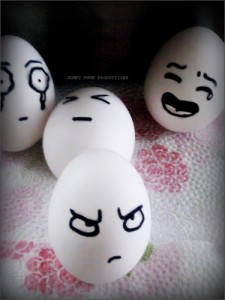I was reading a book the other day … a highly educated, informative tome with dozens of pages of footnotes and an index as long as your arm. It was written, needless to say, by a well-educated person, published by a well-known publishing house and, no doubt, read over by many a skilled and critical eye for typos and errors.
However, it’s a fact of life, though, that errors slip into even the most carefully produced books.
In this case, it was the “yolk of oppression.”
Instead of the bright yellow center of an egg, the author meant the wooden yoke that harness oxen and other animals to carts, plows and other labor-intensive vehicles.
But there it was, glaring as bright as ever a sunny-side up shone from a dish.
Do I think that the author didn’t know the right word? Of course not.
Do I think he mistyped it? Possibly, or it could have been the type-setter, or any person along the line who made a small little goof. I don’t doubt that the people involvedwere well-trained and attentive to their work, but this was a big project. Huge, in fact. The book is 688 pages (including the back matter). One or two small errors are bound to happen. In cases like these, you more or less just hope that they’re small ones.
The thing that worries me, though, is not that mistakes happen, but that we’ve become so oblivious to them. And, worse, that they happen so often … careless mistakes, misspellings, slips of the fingers, momentary brain-freezes … that we start expecting them.
I don’t want to sound like a curmudgeon, but it’s a rare day that I don’t see someone making stupid mistakes when they write. (Sometimes it’s me.) Tweets, message boards, blog posts, emails … But it’s one thing when somebody in a rush types “then it’s leg broke” when describing the titanic crash their curio cabinet made after their bloodhound tried to chase the cat over the top. They got caught up in the story, it happens.
It’s a different matter when you stumble across these kind of mistakes in “formal” media like newspapers, magazines, and books. Headlines, for example. Titles on published books. Billboards. You know, places where professional people put together something for the public to see and made a stupid, glaring mistake.
Mistyping “yoke” for “yolk” is minor. Yes, it caught my eye, but I remembered it mostly because of the humor–the mental image of an angry egg cracking a whip over a group of oppressed people. I’m honestly not holding it against the author or publisher (which is why I’m not publicly outing them).
What worries me, though, is that the more we grant free passes for honest mistakes like these, the more we shrug off the they’re/there/their mistakes and people confusing your for you’re, it means the more we’re simply accepting the new, lowest common denominator.
I realize this makes me sound like a crank with nothing better to worry about. There are wars and famine, disease and despair rampant out there in the world, and I’m worrying about typos?
Except… if we can’t be bothered to look after the little details, how can we be sure that we’re looking after the big ones? How can we be sure that society isn’t being as cavalier about the Big Issues that really do come down to life and death when they regularly disregard the simple, little things like spelling, punctuation and saying “thank you?”
Life is made up of small moments and minor details that add up to a life lived with grace and strength as opposed to one that’s careless and slovenly. You don’t need an immaculate home to be a good, worthy, wonderful person. You might even excuse the mess by saying you’ve been too busy saving the spotted owl and trying to solve the problem of world hunger … you’re focusing on bigger things.
But, when you’ve got a potential donor, or client, or anybody you want to impress at all, appearances matter.
You might not think that one, little typo is the end of the world (and I agree), but stop and ask yourself if it was an honest mistake or something that slipped through because you just didn’t care. The answer can make all the difference between a simple, legitimate mistake and the beginning of a slippery slope covered in eggshells and albumen because we were too darn lazy to clean up the yolks when we dropped the first egg.


Deb,
I agree with you—but every time a client’s book comes out, I hold my breath to see what we missed this time. As hard as I try, I’ve never ended up with a perfect book yet. Every book goes through at least three rounds of edits, then the layout is proofread, then the printer’s proof … And there are corrections at every step of the way.
I just finished reading the printer’s proof of a book that three different people had read one to three times each. On the final review of the printer’s proof, I discovered we had left the Web site URL and e-mail of the publisher off the copyright page. We got that fixed, but now I’m wondering: what else did we miss?
It’s really just not possible to be perfect. It’s just sad when people stop trying!
‘Mistyping “yoke” for “yolk” is minor.’
The author, or whoever, mistyped “yolk” for “yoke”, not vice versa 😉
Hi Deb,
I just finished reading this Sunday morning, some bible study notes that talked about the Pharaoh as the “yolk” of oppression and immediately knew it should have been yoke. As I search the phrase, it sent me to your blog–thanks for raising the issue!